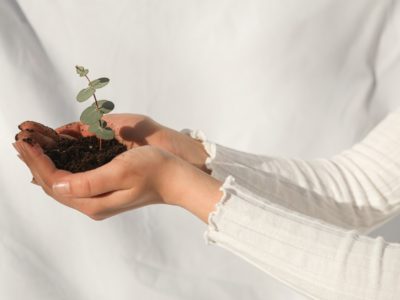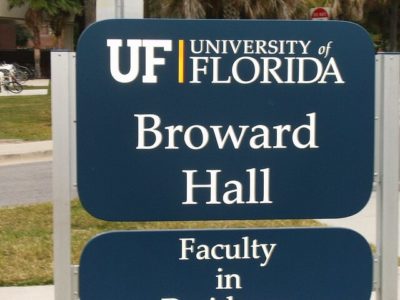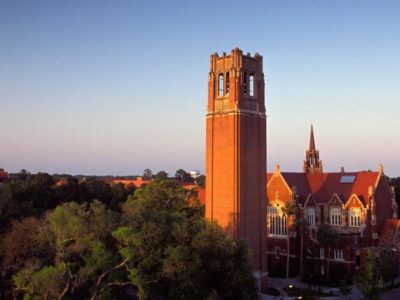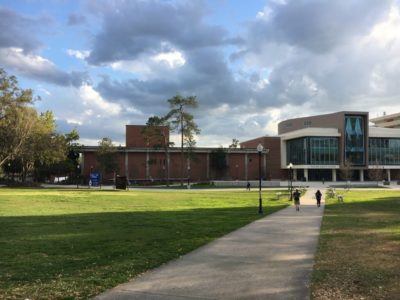Envision this: college life settles in. You slowly acquaint yourself with dorm life, bus rides and cafeteria meal breaks. Life presents different possibilities, but you love it. However, one day on your way to class you notice the thickness of the air and the sound of construction. Your school started construction of a new, state-of-the-art arena. While you should feel overjoyed like other students about the fancy new building, the smog and silica make you wonder, how eco-friendly is my campus? The state of our environment reflects and directly impacts us. While many deny it, climate change is real. But tackling the issue doesn’t need to be hard. For starters, college acts as a great place to jumpstart sustainability.
Follow along for 10 “eco-friendly” things that can spark change at the University of Florida.
1. Going Paperless

Going paperless impacts the environment tremendously and reduces the school’s carbon footprint. We live in the digital age, so let’s take advantage of that. Encouraging students to use their electronic devices to take notes gives universities the opportunity to teach them about sustainability. Plus, typing your notes and then saving them to the cloud presents better reliability than stuffing paper into a binder, right?
“I should be able to use my laptop for everything in class,” University of Florida freshman Juliana Garcia said. “But sometimes my professors require that I print out worksheets, syllabi and sometimes entire chapters of books which is terrible for the trees and eco-system. To back against this, a few friends and I suggested to our professors to send out pdfs and offer the book in an online version.”
Going paperless doesn’t just benefit the environment. It saves times, space and money. Using your laptop, tablet or phone to take notes also adds an extra level of security and organization paper doesn’t give. As technology progresses, it’s important that we take advantage of the benefits that allow us to treat our planet a little better.
2. Educate Students

What better place to teach students about the eco-system and the environment than school—the literal epicenter of education. Imagine if more universities taught students about sustainability regardless of their major! Now that’s one way to stop the planet from burning.
“The University of Florida is the perfect place to educate students and faculty on sustainable practices. But, to do that, they need to lead by example. We are a top five public university research institution—each student should be educated on sustainability.” University of Florida graduate student Zehna Correa said.
From the recycling bins on campus, to the sophisticated bus system, students develop awareness on campus.
“Our planet is clearly being affected by climate change. If UF educates students on sustainability, they could be a part of the solution,” University of Florida junior Liliana Sapin said. “Even though we have sustainability, energy and environmental majors at UF, every student can benefit from learning how to treat the earth.”
Plus, in 2019 the Gainesville area took a huge step forward in their sustainability efforts by banning single-use plastic at every store and restaurant, unless requested. The ban remains part of the city commissions plan to make Gainesville waste-free by 2040.
3. Encourage Students to take the bus or carpool

The University of Florida’s got this one down. Most students take the bus to campus daily. The city of Gainesville and UF offer a free bus system, called RTS, for students and residents in the area that allows them to track their bus route from their phone. Also, UF offers a few different transportation options outside of the bus like bicycle rentals, campus cab, Gator lift, Lyft discounts, Zip Car sharing and many more. With such great perks and deals, students cut down on their carbon footprint and save money. #freerideseveryday
4. Support local farms and shops

Supporting local shops and farms increases the revenue for small businesses (#supportsmallbusinesses). During the pandemic, small businesses suffered. Not only does supporting small businesses help the owners, but it also contributes to healthier lifestyles. Additionally, students gain exposure to healthier, less processed foods. But UF’s expansion efforts should not hinder their partnerships with local businesses.
“A few weeks ago, I talked to the owner of a local pizza shop near campus. He expressed to me his shop recently closed down because UF wanted to use his space to build something new,” University of Florida junior Sydney Khanthavong said. “UF continues to build and construct new infrastructures that contributes to emissions and noise pollution for the ‘swamp.’ They spend so much money gentrifying the area to make it look pretty but allocate very little to protect nature and vulnerable communities on campus.”
Pouring into small local businesses allows UF to connect with communities around campus, while also maintaining the older structures around town. In the past large corporations and small businesses don’t always possess equal relationships, but UF can help change that if they choose more ethical and sustainable practices.
5. Less Plastic Bottles and More Water Bottle Refilling Stations

Water bottle refilling stations, yes please! I mean, these gadgets—A-MAZ-ING! They encourage students to stop using single waste plastic water bottles and start using reusable bottles. While we can see some refilling stations on campus, they feel far and few. Plus, UF still sells plastic water bottles everywhere across campus. A little backwards right? What if instead of selling single use plastic water bottles, they sold reusable bottles that you refill at the water refilling stations? Just a little food for thought.
6. Add More Recycling Bins

Just because they coupled trashcans recycling bins on campus, UF officials assume that all students understand the recycling process. Well… they don’t. Now, this issue ties back to educating students on campus about sustainable features provided, but UF should probably also explain the recycling system a little better. Students express the lack of encouragement from administration and a lack of knowledge surrounding sustainable practices around campus. Why station recycling bins if no one knows why we need them in the first place?
7. Create More Compost Drop-Off Bins

Over 55,000 students attend the University of Florida, and at least 5,000 live on campus. From snack wrappers to lunch trays, the school produces tons of food waste. Not to mention the dozens of plates trashed daily because no one wanted meatloaf from the café. However, one way to combat the issue can mean adding compost bins around campus.
“There are compost bins in the Reitz Union and campus bathroom, but there’s a lack of transparency about where those bins end up” University of Florida junior Andy Shodell stated. “As a student who seeks answers, I have no idea where recycling and compost end up.”
Creating more compost drop-offs will tremendously minimize chemicals and landfill sizes, while also enriching the surrounding soil. For those of you who never heard of composting, read along. A compost bin acts as a container to place organic matter into. Over time the food breaks down and microorganisms from the soil eat the waste. The leftovers get put into the soil. Super cool concept, right? Composting food doesn’t present much difficulty. Just think of the little plants and animals that will benefit from students’ simple actions.
8. Store Rainfall on Roofs

Storing Rainfall on Roofs, also known as Rainwater Harvesting, recycles rainwater into regular tap water. Great right? On top of that, the rainwater improves plant growth and soil fertility. The rainwater can remove salt and build up from the soil. Additionally, the rainwater lacks the pollutants and contaminants found in regular water, which can promote healthier plants. Storing rainwater on roofs around campus also decreases flooding. Since Gainesville, known as the “swamp,” rains and floods so often, rainwater harvesting can make driving in the rain easier by reducing the amount of flooding in the area.
9. End Deforestation Practices

Decades ago, only trees and native land lay where the University of Florida stands now. Today, the campus stretches across 2,000 acres, making UF the fifth largest university campus in the United States. It keeps on growing with no end in sight. Each expansion plan or building blueprint involves deforestation of surrounding areas that affects wildlife, weather patterns, ecosystems and the climate.
10. Offer a Campus Thrift Shop

Fast fashion gained a lot of traction throughout the past decade and the mass production of clothing devastates the environment. The fashion industry uses an excessive amount of water, causing plastic microfiber build-up in the ocean and pumps toxic chemicals into the environment. A campus thrift store comes in handy here. A campus thrift store cuts back on student consumption in the fashion industry by allowing them to shop recycled items comfortably after class, or between study sessions.
“Typically, fast fashion brands produce a ton of cheap items very quickly,” Correa said. “Today, it is so common for people to wear something once and throw it out. Instead of throwing clothes away, students can donate them. This allows students to purchase clothing ethically.”
On top of that, a campus thrift shop offers a place for students to buy affordable pieces. A campus thrift shop can ease the financial burden of tuition and the expense of shopping for many. Creating a thrift shop also adds flavor to a university. Just imagine all the cute pieces you could get thrifting!
A final note

Going away to college, many of us don’t know much about sustainability, but if more schools incorporate eco-friendly practices on campus, students will leave ready to change world. I know that by addressing these ten issues, UF can increase sustainable qualities to help save the earth. Not just for the students of today but for the students of tomorrow. What ways can your school become more eco-friendly?



















